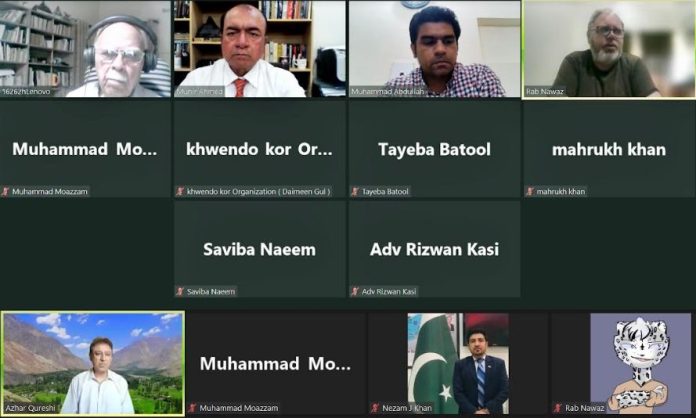DNA
Islamabad, MAY 20: The unsustainable housing policies and timber mafia are the biggest threats to the green and agricultural land of Pakistan, causing immense threats to ever rapidly decreasing forests and biodiversity. The Pakistan government shall impose emergency nature conservation to protect green and agricultural lands to protect 260 million people from climate impact, water and food insecurity.
Mountain resources are threatened particularly despite several sustainable development and conservation. Pakistan needs to eliminate the highhandedness of the mafias that are over-exploiting the natural resources, chopping off forests and damaging ecological habitats and systems. Strict implementation of the legislation urged to wipe off the hindrances to nature conservation.
The national webinar on “The State of Pakistan’s Forests and Biodiversity and the way forward” was organized by the Development Communications Network (Devcom-Pakistan) on Saturday. The keynote speakers included Pakistan’s well-known and oldest biodiversity scientist ZB Mirza, WWF-International Senior Expert on Area-based Conservation Rab Nawaz. Other guest speakers were Devcom-Pakistan Executive Director Munir Ahmed, Director Cholistan Institute of Development Studies (CIDS) at Islamia University Bahawalpur Dr. Muhammad Abdullah, AJK conservation expert Aftab Hussain Bokhari, marine biodiversity expert Moazzam Khan, eco-conservation expert Azhar Qureshi and National Defense University graduate Mahrukh Khan.
ZB Mirza said Pakistan water resources are depleting fast with degradation for forests and biodiversity despite several conservation efforts and best practices. The conflicts between the stakeholders have added to the vulnerability of the natural resources. The timber foresters and ecologists need to resolve their conflicts on sustainable approaches. The depletion of forests is causing soil erosion, diminution of microbes, reduced fertility, and subsoil water and biodiversity.
Rab Nawaz from WWF, commenting on the progress that Pakistan has made on Convention of Biological Diversity said that there have been some great successes on bending the curve such as the Indus Blind Dolphin where the population is recovering slowly but surely. The national animal of Pakistan, the Kashmir Markhor has been brought back from the verge of extinction. He continued to point out that this is only possible when departments, civil society organizations and communities come together and join hands. Highlighting the challenges, he pointed out that though some species are doing well, there are few that are dangerously close to extinction such as the Great Indian Bustard and the Arabian Humpback Whale and encouraged everyone to join resources to ensure that these species are around for future generations.
Munir Ahmed said Pakistan’s all ecological zones are suffering because of the rapid urbanization and unsustainable development, and by the nexus of unwise influential. It’s the time to voice the conservation emergency all over the country including AJK and Gilgit-Baltistan.
Dr. Muhammad Abdullah said Cholistan desert is facing the challenge of ever fast increasing population, livestock and permanent housing. The government and private sector are converting barren desert into cultivable land that would wipe off all the desert species. To explore and conserve natural resources and to alleviate the sufferings of inhabitants of Cholistan desert, the Islamia University of Bahawalpur has established the Cholistan Institute of Desert Studies (CIDS). The Institute has initiated many useful projects pertaining to the exploration and utilization of desert’s resources such as climate change, desert agriculture, biodiversity conservation, and natural hazards with an impact on legislation, economics, and social welfare around the world.
Muhammad Moazzam Khan said with a long coastline, Marine Biodiversity supports a large seafood industry of Pakistan that produces about 450,000 metric tons of fish and shellfish and a source of export earnings of around US $ 480 million annually. It is a major source of livelihood for coastal communities living along the 1,000 km coast and provides employment to about 10 million people. It contributes about one percent to national GDP and 4 percent of Agriculture GDP.
He said Marine biodiversity of Pakistan is being threatened by uncontrolled commercial fishing operations in coastal and offshore waters using some of the deleterious fishing gears and undesirable practices. Trawling for fish and shrimp and use of gillnets are most dangerous fishing gear which has led to destruction of habitat for fishes and shellfishes and marred with bycatch of some endangered, threatened and protected species including turtles, sharks and dolphins. Increased pollution from the metropolis of Karachi has led to elimination of marine life around some areas of Karachi. Dumping of about 400 million gallons of untreated sewage, both industrial and domestic, in the ocean is one of the threats which affects marine life along the coast of Pakistan.
Azhar Qureshi said Agro biodiversity plays a crucial role to conserve the environment, restore our ecosystems, mitigate climate change and foster food security. No doubt Pakistan has some good cases where agrobiodiversity is conserved with support from foreign-funded projects. However, the sustainability of these projects is ensured for a long time. Our agrobiodiversity is getting seriously affected due to rapid urbanization, chemical pollution through industries, deforestation and melting of glaciers.

















